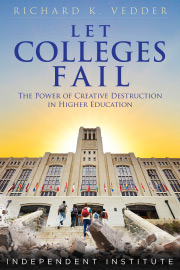Probably the most important federal funder of traditional advanced research is the National Institutes of Health (NIH). President-Elect Trump has appointed a remarkable man to head that key branch of the federal government, Jay Bhattacharya, M.D., and Ph.D. Professor Bhattacharya is the only person I have ever met who has published articles in such prestigious economic journals as the Journal of Economic Perspectives and the Journal of Human Resources AND in such top medical journals as the New England Journal of Medicine. The combination of extraordinary insight into conditions afflicting and ultimately killing human beings with a keen appreciation of the opportunity costs and economic benefits of eradicating disease is extremely rare.
Yet the experts in charge of national public health administration viciously vilified Bhattacharya in the wake of the Great Barrington Declaration issued in October 2020 by Bhattacharya and professors from Harvard and Oxford. The Director General of the World Health Organization thought the idea of pursuing “herd immunity” before vaccination was “scientifically and ethically problematic.” Then NIH director Francis Collins told the veteran leader of the public health establishment, Anthony Fauci, that “there needs to be a quick and devastating published take down of its premises.”
Essentially, Bhattacharya was arguing that special protection and isolation of older, highly vulnerable Americans from the potentially great ravages of COVID-19 were justified but that younger Americans who got the disease would survive and thereby hasten its demise through herd immunity. In retrospect, he seems to have been largely right. Countries like progressive Sweden, which did not enact draconian mandates to shield citizenry from COVID-19 and did not suffer greatly relative to neighboring nations that enacted such strictures.
The economic damages of pandemic isolation were severe. Real GDP was 10 percent lower in the second quarter of 2020 than in the last pre-pandemic quarter—the last quarter of 2019. The unemployment rate of 3.5 percent in February 2020 rose to double digits from April through July and was still 6.9 percent—double pre-pandemic levels—when the Great Barrington Declaration was issued.
Still worse, in the longer term, student learning nosedived as hasty shifting to remote classroom teaching led to huge declines in student knowledge acquisition. Scores plummeted on international tests. Even at the college level, I observed it: my economic history students taking my course remotely in 2020 did not learn nearly as much as the ones taking it pre-COVID-19 a year earlier.
Scientific advances and human welfare are enhanced when we have a free flow of ideas and freedom to express ourselves. Galileo was persecuted for his correct theories, which enormously expanded our knowledge of the universe in which we live. Putting leaders like Jay Bhattacharya into position of leadership probably will strengthen the environment for exploring alternative perspectives.
Amidst the pandemic but after the issuance of the Great Barrington Declaration, the top public health official in my county, Dr. J.R. Gaskell, a physician friend of mine, and I met with Bhattacharya over lunch. We found him to be what one might expect of a top Stanford academic: someone highly intelligent with engaging and challenging ideas, not some moronic ideologue. I had coincidentally recently also stayed at the beautiful Great Barrington, Massachusetts mansion where the Declaration was promulgated and was impressed with the owners’ staff, the American Institute for Economic Research. Moronic ideologues, they were not.
Perhaps the greatest strength of America’s universities arises from the largely decentralized nature of the enterprise—hundreds, even thousands, of distinct institutions, all with their own educational philosophy and emphasis. Our “American” system of advanced learning is really thousands, maybe millions, of different voices offering different, often controversial, positions on the human and physical environment we live in. When we overcentralize things—have one Czar of public health or Czarina of Education—we subdue the diversity that propels the dissemination and evaluation of multiple ideas.
America is facing a credibility crisis in science as numerous scandals about fictionalized and plagiarized research have shockingly demonstrated. I suspect Jay Bhattacharya will try to help restore integrity to that effort so that the United States can justly and proudly maintain its primacy in the advancement of knowledge, improvement in living standards and life expectancy, and other positive characteristics of the remarkable progress made in the quarter of a millennium since the creation of this nation.













